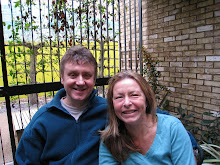Time for a serious post (the first in an occasional series).
Up until now we’ve been reporting like tourists, but we’re starting to see beneath the surface a bit so the tone of this one is a little different.
Well, this is Africa after all and Eritrea is a poor country which accepts a lot less in the way of help from the outside world perhaps because the institutions of the outside world have never been of much help (betrayal is the word used in a book on Eritrea by Michela Wrong - PLEASE READ IT - when talking about Italy, Britain, the UN, especially the UN, and the USA). VSO is permitted to be here in education only and is perceived as a good thing because its volunteers get stuck in and work alongside Eritreans at less-than-the-usual-NGO wages. I'm not looking for a slap on the back for this fact though. Please read on ...
Last week there was a girl - 11, 12 years old, not much younger than one of my nieces. She was pretty with a shy smile. She was poor. Her school uniform sweater was in holes. She wasn't very clean. She gave Caroline bougainvilla flowers. She followed us home. I hated myself for thinking "she wants money in return for the flowers". She waited for a while at our gate, then she left empty-handed.
We're asked for money a lot and the standard thought is "we're volunteers, we don't have unlimited money to give away" but it's not really like that because, at the end of our time here, we'll be going home ... it's like the line from that Pulp song "if you called your dad he could stop it all" so what to do? - probably give money to the occasional thin, sad, old lady and feel guilty the rest of the time.
So why come here? Well (and of course I didn't know this beforehand) Eritrea's education policy is, in general, a good one under difficult circumstances - get Education out to everyone, modernise as much as possible - hence ICT training for all is a goal, not there yet though!. Eritrea has a number of mother-tongues (7?) so a system has been devised whereby children are taught in their own language until Secondary school age and then taught in English - can you imagine how hard that must be? Add in the different customs of the different ethnic groups (there is one volunteer whose school terms often start late because the children are from a nomadic tribe and aren't there yet - so you go to the top of the nearest hill and shout "WHERE ARE YOU?" - probably not ...). There is also (reportedly) far too much use of corporal punishment in schools - it's still the norm.
But, to end on a positive note, progress HAS been made - I read a report which gave 20% literacy rate for the country in 1995 - even the UN says the figure will approach 80% by the 2015 millenium-target year. So, if we can contribute to the education effort over the next two years it WILL be a good thing and hopefully we will have made a difference however small.
P
Saturday, 29 March 2008
Subscribe to:
Post Comments (Atom)




No comments:
Post a Comment